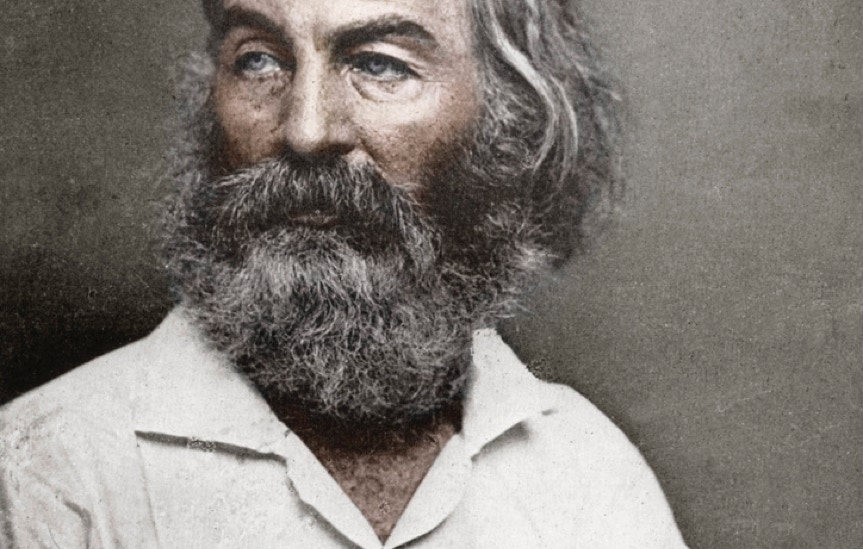
Not long after arriving in New York in January 1882, at the start of Wilde's lecture tour of North America in 1882 Oscar Wilde expressed a fervent wish to meet the American poet Walt Whitman, whose works he had been familiar with from a young age.
At this time Whitman was living in partial retirement at Camden, NJ, across the Delaware River from Philadelphia. As Wilde was scheduled to lecture in Philadelphia on January 17, he wasted no time in inquiring whether a meeting with Whitman could be arranged.
On January 11, J.M. Stoddart, Wilde's friend and publisher in Philadelphia, wrote to Whitman:
Oscar Wilde has expressed his great desire to meet you socially. He will dine with me Saturday afternoon when I shall be most happy to have you join us. The bearer, Mr. Wanier, will explain at greater length any details which you may wish to know, and will be happy to bring me your acquiescence.
Even before a meeting had been arranged, the press became excited at the prospect:
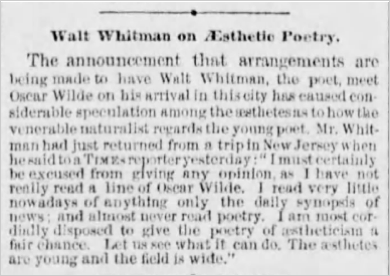
Unfortunately, Whitman was not well enough to travel across the river to Philadelphia. He wrote to Mrs. George W. Childs (the wife of the Philadelphia publisher at whose mansion the meeting was proposed) with this apology:
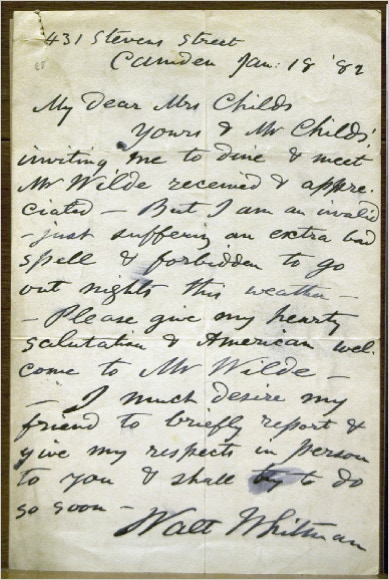
So the meeting would have to take place at Whitman's lodgings at 431 Stevens Street, Camden, NJ. [1]
There must have a been an immediate reply to this letter as Whitman confirmed his availability the same morning:
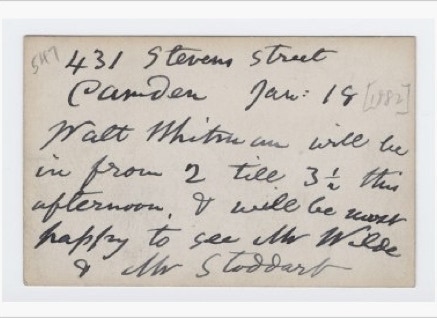
So on January 18, the day after Wilde's lecture, Wilde and Stoddart traveled over by ferryboat to visit Whitman. Stoddart left the two poets alone for two hours and a pleasant meeting ensued over wine and milk punch.
Wilde told the Boston Herald (January 29, 1882, 7):
I spent the most charming day I have spent in America with him. He is the grandest man I have ever seen. The simplest, most natural, and strongest character I have ever met in my life. I regard him as one of those wonderful, large, entire, men who might have lived in any age and is not peculiar to any one people. Strong, true, and perfectly sane: the closest approach to the Greek we have yet had in modern times. Probably he is dreadfully misunderstood.
That same evening a reporter from the Philadelphia Press ventured over to find out more about the auspicious occasion, and his interview with Whitman formed the basis of the report below that appeared the following day.
For Whitman’s part, he wrote to his friend Harry Stafford a week later:
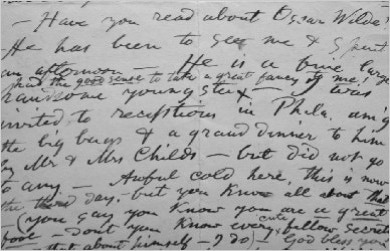
Letter from Walt Whitman to Harry Stafford, January 25, 1882
Source: Walt Whitman Archive
Transcription:
Have you heard about Oscar Wilde? He has been to see me & spent an afternoon — He is a fine large handsome youngster. ^ (interlinear) he had the good sense to take a great fancy to me.
Related:
Walt Whitman and Oscar Wilde: A Biographical Note by Gary Scharnhorst
[1] 431 Stevens Street, Camden, NJ, was the residence of Walt's brother, George, and it was where Whitman was living when he met Wilde. They did not meet at the house on Mickle Street that Whitman later purchased which is now the historic Walt Whitman House.
When Wilde learned he was scheduled to lecture again in Philadelphia on May 10, he inquired about Whitman's whereabouts, and then wrote to him to ask if another meeting could be arranged.
See partial manuscript letter.
The second meeting duly took place on May 10, 1882, as evidenced by Charles Godfrey Leland in his journal—for this, see details at Wilde's second lecture in Philadelphia.
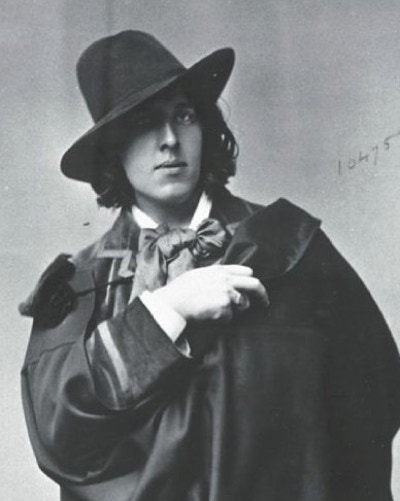
Oscar Wilde aged 27 when he met Whitman
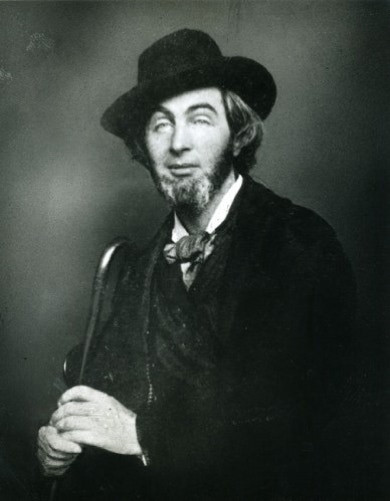
Walt Whitman aged c. 28-35
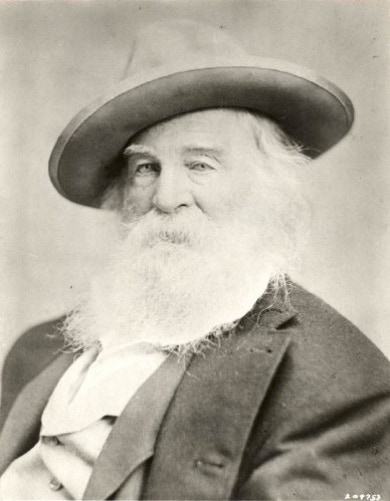
Walt Whitman aged 62 when he met Wilde
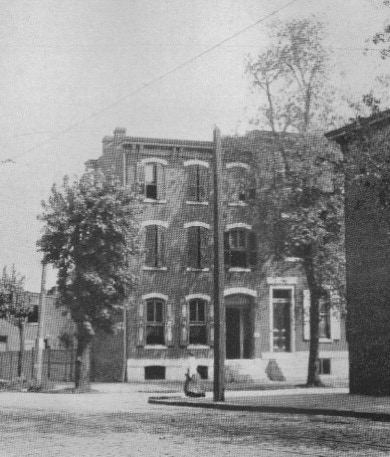
The house where the meeting took place.
Image courtesy of Mark Samuels Lasner
University of Delaware
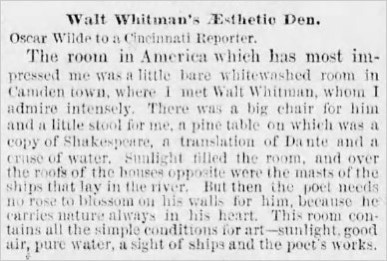
Philadelphia Times, February 23, 1882
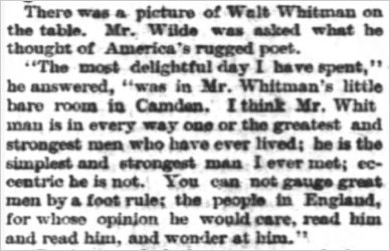
Courier Journal (Louisville), January 22, 1882
Wilde was reported to have said that the poor quality of the elderberry wine that Whitman served meant nothing to him; he would have drunk it had it been vinegar.
This following is the earliest source of the story given by J.M. Stoddart who had taken Wilde to see Whitman.
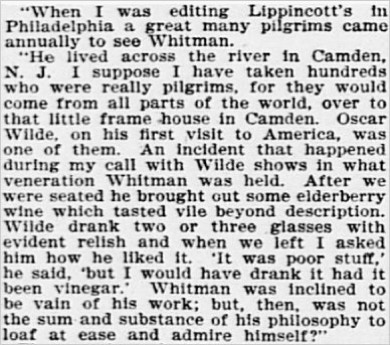
Kansas City Journal, November 12 1899, 12